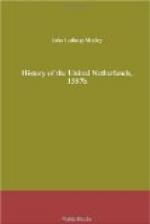“Your Majesty will hear,” wrote Parma to Philip, “of the disastrous, lamentable, and pitiful end of the, poor Queen of Scots. Although for her it will be immortal glory, and she will be placed among the number of the many martyrs whose blood has been shed in the kingdom of England, and be crowned in Heaven with a diadem more precious than the one she wore on earth, nevertheless one cannot repress one’s natural emotions. I believe firmly that this cruel deed will be the concluding crime of the many which that Englishwoman has committed, and that our Lord will be pleased that she shall at last receive the chastisement which she has these many long years deserved, and which has been reserved till now, for her greater ruin and confusion.”—[Parma to Philip IL, 22 March. 1587. (Arch. de Simancas, Ms.)]—And with this, the Duke proceeded to discuss the all important and rapidly-preparing invasion of England. Farnese was not the man to be deceived by the affected reluctance of Elizabeth before Mary’s scaffold, although he was soon to show that he was himself a master in the science of grimace. For Elizabeth—more than ever disposed to be friends with Spain and Rome, now that war to the knife was made inevitable—was wistfully regarding that trap of negotiation, against which all her best friends were endeavouring to warn her. She was more ill-natured than ever to the Provinces, she turned her back upon the Warnese, she affronted Henry III. by affecting to believe in the fable of his envoy’s complicity in the Stafford conspiracy against her life.
“I pray God to open her eyes,” said Walsingham, “to see the evident peril of the course she now holdeth . . . . If it had pleased her to have followed the advice given her touching the French ambassador, our ships had been released . . . . but she has taken a very strange course by writing a very sharp letter unto the French King, which I fear will cause him to give ear to those of the League, and make himself a party with them, seeing so little regard had to him here. Your Lordship may see that our courage doth greatly increase, for that we make no difficulty to fall out with all the world . . . . . I never saw her worse affected to the poor King of Navarre, and yet doth she seek in no sort to yield contentment to the French King. If to offend all the world;” repeated the Secretary bitterly, “be it good cause of government, then can we not do amiss . . . . . I never found her less disposed to take a course of prevention of the approaching mischiefs toward this realm than at this present. And to be plain with you, there is none here that hath either credit or courage to deal effectually with her in any of her great causes.”




